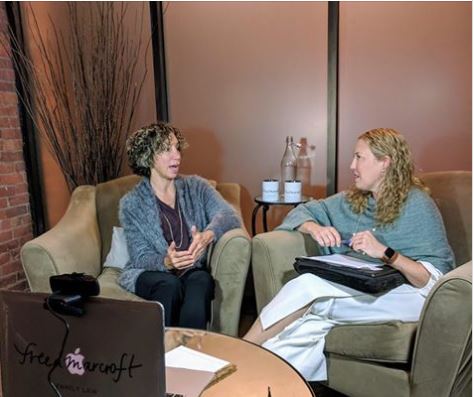A few weeks ago I did a Webinar with a special guest, Dr. Dori Gatter, from our Hartford offices. It was about the ‘tough conversations’ in life. Sometimes in life the talk you’re most afraid of is the one you most need to have.
It was a great talk for me, it hit home, as it always does, because the lawyers at Freed Marcroft not only have to encourage our clients to engage in tough conversations with their significant other and children and whoever else will be affected by the decision to divorce, we have to have tough conversations with our clients almost every day. Because sometimes our clients need to make decisions – hard decisions – and not approaching that conversation honestly and directly is counterproductive to great legal representation.
At one point late in our discussion Dr. Gatter mentioned the value of counseling. She, quite rightly in my opinion, suggested that if someone, for whatever reason(s), is hesitating to have that conversation, despite the fact it may change their life so much for the better, they should talk to someone. She added that people have blind spots, blind sides, really, especially in personal relationships, and need to talk with someone to not only see them but get past them.
Shortly after we shut the camera off (yeah, only one, we’re not MSNBC … yet) I received a text from a friend of ours:
Hey, nice webinar, have a thought, don’t necessarily agree about not being aware of ‘a blind side’ … think more than a few people are very aware of their blind side when dealing with a spouse and it’s that awareness that holds them back – they’re too aware, see too far down the road because of this awareness (“yeah, we’ll work it out okay, but I know I’ll cave when she mentions ‘x’ but I don’t want to .. but I will … .so why bother?)” Or along those lines.
I got his point. And starting thinking. First – and I texted this back to him – that what he was talking about wasn’t a blind spot or side, it was denial. Then, it hit me that instead of writing ‘blind spot’ he wrote ‘blind side’ and he’s not the kind of writer to make that change without a reason.
So, I texted ‘did you mean blind spot or side?’ He (eventually) responded with this:
Blind SIDE – if you haven’t read the book, listen to the first couple of minutes of the movie. Forget the feel-good story stuff.
Cryptic enough, but I did listen to the first few minutes and I did zip through the book and I got exactly what he meant . . . plus a bit more, I think, because I was reading it with an eye toward learning things applicable to our firm and family law.
Here’s the thing. The movie version of The Blind Side is about half the book, the part about a rich, white, Christian family raising a poor black kid and all of them succeeding … wildly. Sandra Bullock won the Academy Award, everyone was happy.
But, the book is subtitled: Evolution of a Game, and, as befits anything written by Michael Lewis, it’s goes a lot deeper than the feel-good story of Michael Oher.
He writes about the immense shift in the NFL from the 1970s to today where passing has taken over the game. With passing so important the quarterback (we have a fairly decent one 90 minutes away over the Mass line, I think) became the superstar and highest paid player. Most quarterbacks are right-handed, when they go back to pass they can’t see what’s coming at them from the left.
The blind side. To function as a modern-day quarterback who has about 3.5 seconds to calculate passing routes with the precision of a chess master, he must not be hit. He must know his blind side is covered. Quarterbacks who know they have protection, are fine, some great. Quarterbacks who have to worry about their blindsides, who never know when they’re going to get hit, don’t last long in the NFL – and if their team doesn’t fix the problem, the next All-American, first round draft pick is going to end up the exact same way.
Michael Oher’s story was a book and a movie because by the time Michael was in middle school the second highest paid player on most NFL teams was the left tackle – the guy who protected the quarterback’s blind side.
To be a left tackle took – and takes – a remarkable set of physical criteria found in an infinitesimal small percentage of population. Michael Oher fit those criteria at a young age.
I think it’s probably obvious why I’m writing about this, it’s scary how well all this applies to family law. A client has to – has to – know that their blind side, spot, weakness, whatever it is that keeps them awake at night frightened of the next – or first – step toward a divorce is covered. Completely.
Sure, they might survive a ‘surprise’ in the proceedings, could weather the storm, might even scramble out of the mess with the best of them, but it will always only make it harder down the road.
A good family law firm recognizes their clients’ blind sides and has the personnel to protect them right through to the end.









